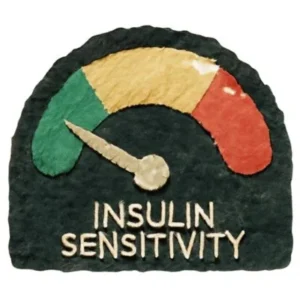Have you ever felt like you were doing everything right — eating less, working out, trying to be disciplined — and yet your weight wouldn’t budge?
Or maybe you’ve felt the opposite: you started fasting, and suddenly cravings disappeared, your energy soared, and weight dropped effortlessly.
Table of Contents
ToggleWhat’s the difference between those two experiences?
👉 Hormones.
Calories matter, yes. But your body is not a calculator — it’s a symphony. And hormones are the conductors of that symphony.
They decide whether food is stored or burned, whether you feel hungry or satisfied, whether your metabolism runs hot or slow.
Fasting is powerful because it doesn’t just cut calories — it reshapes hormones.
In this guide, we’ll explore four of the most important hormonal players:
- Cortisol (the stress hormone)
- Thyroid hormones (T3, T4) (the metabolic regulators)
- Ghrelin (the hunger hormone)
- Leptin (the satiety hormone)
And by the end, you’ll not only understand how fasting affects them, but also how to make those changes work for you.

Cortisol: The Double-Edged Sword
What is it?
Cortisol is your body’s stress hormone, released by the adrenal glands.
It wakes you up in the morning, raises blood sugar for quick energy, and helps you handle fight-or-flight moments.
Fasting & Cortisol
- In short-term fasting, cortisol often rises slightly.
- This is adaptive — it helps mobilize fat stores and keeps blood sugar stable.
- Cortisol works with growth hormone and adrenaline to give you mental clarity and energy during fasts.
👉 That’s why many people feel sharp, alert, focused while fasting.
But here’s the catch
If cortisol is chronically high (due to poor sleep, overtraining, constant stress), fasting can tip the balance toward fatigue, anxiety, or sleep disturbances.
Evidence
Studies show that moderate fasting raises cortisol temporarily in healthy adults — but when combined with adequate recovery and nutrition, it doesn’t harm.
Practical Tip
- Fasting + good sleep = balanced cortisol.
- Fasting + chronic stress + poor sleep = trouble.
- Gentle exercise (walking, yoga) during fasts supports cortisol balance.
Thyroid Hormones: Metabolism’s Thermostat
What are they?
Thyroid hormones (T3 and T4) regulate how fast your body burns energy — your metabolic rate.
Fasting & Thyroid
- During fasting, T3 (the active thyroid hormone) may dip slightly. This is the body’s way of conserving energy.
- But here’s the nuance: the drop is usually temporary and mild, not enough to cause “metabolic damage.”
- Long-term calorie restriction diets lower thyroid function more than intermittent fasting does.
Evidence
Research shows fasting improves insulin sensitivity and lowers inflammation — both of which support thyroid health in the long run.
Extended fasting needs caution in those with hypothyroidism.
Practical Tip
- Intermittent fasting (16:8, 18:6) is generally safe for thyroid.
- Extended fasts should be carefully monitored if you have thyroid issues.
- Always refeed with nutrient-dense foods (iodine, selenium, zinc, tyrosine — nutrients your thyroid loves).
Ghrelin: The “Hunger Hormone” That Teaches You Control
What is it?
Ghrelin is produced in your stomach and signals hunger to your brain. It spikes before meals, then falls after eating.
Fasting & Ghrelin
- During the first few fasts, ghrelin spikes may feel intense (that growling stomach).
- But with repeated fasting, ghrelin adapts. Your hunger signals retrain themselves.
- Many fasters report: “The hunger just… disappears.”
Evidence
Studies show ghrelin doesn’t just keep rising with fasting — it pulses in waves, then normalizes.
Long-term intermittent fasters have lower baseline ghrelin and report less hunger.
Practical Tip
- Expect hunger “waves” around usual mealtimes. Wait 10–15 minutes, and it often passes.
- Black coffee, tea, or water help tame ghrelin.
- With consistency, fasting reduces—not increases—hunger.
Leptin: The “I’m Full” Hormone
What is it?
Leptin is released by fat cells and tells your brain you’re satisfied.
Think of it as the brake pedal to ghrelin’s gas pedal.
Fasting & Leptin
- Obesity often comes with leptin resistance: high leptin levels, but the brain ignores the signal → constant hunger.
- Fasting lowers insulin and fat mass, restoring leptin sensitivity.
- Over time, your brain “hears” leptin again, and appetite normalizes.
Evidence
Time-restricted eating and fasting reduce leptin levels in overweight individuals, improving satiety signals.
Practical Tip
- Combine fasting with nutrient-rich, anti-inflammatory meals to maximize leptin reset.
- Avoid processed sugar and refined carbs, which disrupt leptin signaling.
The Hormonal Dance Together
It’s not just one hormone — it’s the interplay.
- Cortisol rises during fasting → mobilizes fat.
- Ghrelin spikes but adapts → hunger diminishes.
- Leptin resets → satiety improves.
- Thyroid adjusts slightly → conserving energy, but not damaged.
Together, fasting creates a hormonal environment where fat is burned, cravings drop, energy stabilizes, and metabolism becomes flexible.
Let’s Be Honest Here
Let me ask you directly.
👉 Do you ever feel like your cravings control you, instead of the other way around?
👉 Do you notice energy crashes in the afternoon, no matter what you eat?
👉 Do you wonder why your weight doesn’t move, even when you’re “eating healthy”?
If so, it’s not about your willpower. It’s about your hormones.
And this is where fasting shines: it resets those signals. But here’s the key — fasting is not a one-size-fits-all tool.
For some people, ghrelin adapts quickly; for others, cortisol needs extra attention. For women, thyroid shifts can feel different than for men.
That’s why working with guidance matters.
When I see patients, the conversation isn’t about “skipping meals.”
It’s about teaching their hormones to listen again — so hunger, satiety, stress, and metabolism work in harmony.
FAQs
Q: Will fasting ruin my thyroid?
👉 No, intermittent fasting has minimal impact. Extended fasts need medical supervision, especially with hypothyroidism.
Q: Why do I feel hungrier at first?
👉 Ghrelin is spiking at your old mealtimes. Stay consistent; hunger fades as your clock resets.
Q: Does fasting increase cortisol too much?
👉 Short-term increases are normal and beneficial. Chronic stress + fasting can be problematic — that’s why stress management is key.
Q: Can fasting fix my leptin resistance?
👉 Yes, by lowering insulin and fat mass, fasting restores leptin signaling and reduces constant hunger.
Q: Is fasting safe for women’s hormones?
👉 Yes, but women may benefit from gentler schedules (14–16 hrs) and cycle-aware adjustments.
Hormones First, Weight Second
Most people chase weight loss directly.
They count calories, obsess over the scale, and punish themselves when numbers don’t move.
But the truth? Weight is not the first domino. Hormones are.
Fasting works because it flips the hormonal switches back in your favor:
- Cortisol sharpens instead of draining.
- Thyroid adjusts without damage.
- Ghrelin stops screaming.
- Leptin starts whispering, “You’re satisfied.”
When hormones align, weight follows naturally.
Energy follows naturally.
Peace with food follows naturally.
👉 If you’ve been stuck in the loop of cravings, fatigue, and plateaus, maybe it’s time to stop fighting your hormones — and start working with them. That’s what fasting offers.
But here’s the truth: everybody is unique.
Some need short fasts, some need longer cycles, some need thyroid support, some need stress balancing.
That’s where professional guidance changes everything.
Instead of guessing, you get a tailored map for your hormones, your body, your life.
Because fasting isn’t just about “not eating.”
It’s about healing your relationship with your hormones — and with yourself.






